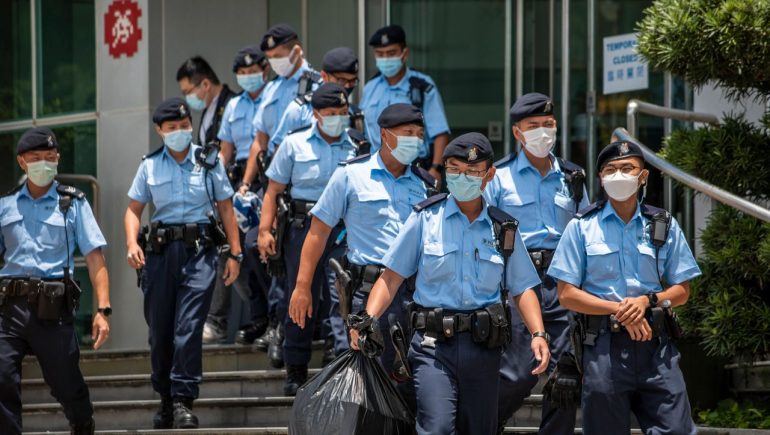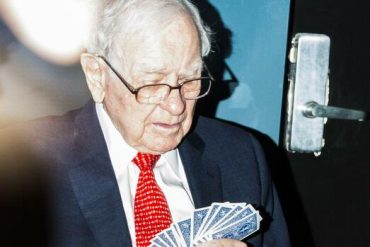As usual this time 500 policemen came, and a few hours later there were five senior editors and managers Arrested. In the open-plan offices of Apple Daily, Hong Kong’s last newspaper to criticize China, officials sat down at reporters’ desks and got to work.
Journalists coming to work as usual in the morning were sent to the canteen and taken into custody there. According to investigators the editorial building is now a “crime site”.
International media such as the New York Times and the British Guardian described the raids early Thursday as “sharp” and a “significant increase”. In fact, it also marked the beginning of the end of press freedom in Hong Kong, which has been gradually banned for a year. In late June 2020, Beijing, a former British Crown colony, had a harsh state security act which provides for imprisonment up to life for vaguely defined offences. More than 100 civilians, including several politicians and democracy activists, have already been indicted under the Security Act.
Alleged: Conspiracy
The interior minister accused the five arrested on Thursday of “using journalistic acts to conspire with foreign states or outside elements to support sanctions or hostile acts against Hong Kong and the central government.”
It’s the same crime as the founder of Apple Daily Jimmy Laiss He has been charged – along with several other offenses for which he has already been convicted. Lai, 72, along with activist Joshua Wong, is one of the most prominent opponents of Hong Kong’s government.
Since the early 1990s, the tabloid Apple Daily has criticized Beijing’s circumcision of Hong Kong autonomy rights, and in the summer of 2019 it openly sided with the protest movement. Of the “Apple” articles that have surfaced since then, 30 now have to be presented as evidence against the alleged conspirators, mostly opinion pieces, some of which were published under pseudonyms and some of which state were published before the advent of the Security Act. in force.
However, Hong Kong’s judiciary is unlikely to pay attention to such subtleties. always fast Prosecutors and courts have interpreted the law in recent months, and pressure on journalists in Hong Kong has increased.
under pressure for months
In April, the Beijing-loyal “Ta Kung Pao” had already called for a ban on rival newspaper “Apple Daily” as it allegedly sought the city’s independence from China. In May, former head of government CY Leung described Apple Daily as a “subversive organization”.
The once highly profitable newspaper’s circulation had dropped from just over 90,000 copies in the late 1990s to over 400,000. The newspaper itself has long been part of a China-friendly establishment’s strategy to undermine the media company “Next” behind it and its founder, Jimmy Lai. Gradually, the Hong Kong tycoon withdrew his complaints, and after his arrest last year, parts of Jimmy Lai’s personal assets were confiscated. At 8:46 a.m. Thursday, the Hong Kong Stock Exchange finally suspended trading in “Next” shares and accumulated another $2 million in assets.
But the attention of officials is on the report and comments published by Apple Daily. According to a senior investigator, he warned the population not to share newspaper articles on the Internet in the future: “As a member of a law enforcement agency, I would advise you not to raise any doubts.”
Journalists were also warned directly from Home Secretary John Lee: “All journalists in the city must keep their distance. The suspects were arrested on strong evidence of conspiracy against national security. “But none of this has anything to do with restrictions on freedom of the press: “We are not targeting the media,” said principal investigator Steve Lee. We value press freedom.”
2021 – or 1984?
Such cynicism is hard to bear for the employees of Apple Daily, who returned to their editorial offices on Thursday afternoon. “I saw it coming,” says an editor who worked for the newspaper for ten years and cleaned her desk on the second floor. Then she curses – and immediately apologizes. But the fear of getting arrested soon outweighs the worry that you are no longer able to write down what you think.
one of the comments, which is still on the Apple Daily website as of Thursday, “When does State Security arrive at the weather station?”
According to author Chan Kin-man, he was wondering whether he was living in 2021 or 1984. In the early 1980s he was amazed at what the dictators of the Eastern Bloc might think of restricting freedom of expression. For example, Romanian ruler Nicolae Ceauescu registered all typewriters and photocopiers so that every document in the country could be traced back to its author. And before May 1, the government itself censored the weather report so that no one had the idea of skipping the May show because of the rain. Meanwhile, he felt that history was repeating itself. In Hong Kong – a city that was once one of the freest in the world.

Introvert. Proud beer specialist. Coffee geek. Typical thinker. Pop culture trailblazer. Music practitioner. Explorer.





